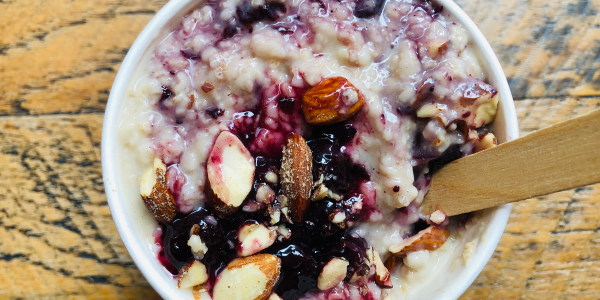Welcome to Start TODAY. Sign up for our free Start TODAY newsletter to receive daily inspiration sent to your inbox and check us out on Instagram — plus, join our 100-Mile Challenge!
Blueberries are bright, beautiful and sweet in the summer and pack a nutritional punch. They've even been named the No. 1 healthiest fruit by dietitians.
One cup of blueberries is a good source of fiber and contains other nutrients, like vitamin C, K and manganese. They are also ripe with polyphenols, beneficial plant compounds that have been studied for their many health benefits.
Research suggests eating blueberries may boost your heart health, brain health, longevity and gut health. Fresh or frozen, blueberries add a subtle hint of sweetness to practically any dish.
Learn more about the nutrition of blueberries, why you should toss this flavorful and low-calorie fruit into your post-workout smoothie, plus other healthy blueberry recipes to try.
Blueberry nutrition facts
One cup of blueberries has:
● 85 calories
● 1 gram protein
● 0 grams fat
● 22 grams carbohydrates
● 4 grams fiber (14% daily value (DV))
● 15 milligrams vitamin C (17% DV)
● 29 ug vitamin K (24% DV)
Benefits of blueberries
Blueberries have been studied extensively for their polyphenol content, including a specific plant compound called anthocyanins, which give blueberries their rich color. This special nutrient has been studied for its role in heart health, and blueberries are actually Certified Heart Healthy through the American Heart Association’s Heart-Check Food Certification Program.
A recent review showed an association between blueberry intake and lower total cholesterol and LDL (bad cholesterol) levels, as well as reduced blood pressure levels. What’s more, a very recent randomized controlled trial concluded that supplementing with freeze dried blueberry powder for 12 weeks improved endothelial function — a significant indicator of heart and artery health — in postmenopausal women with high blood pressure. The study authors attribute this response to the blueberries’ antioxidants that fight oxidative stress.
The inflammation-fighting capacity of blueberries has also been connected to brain health and healthy aging. Studies have shown that early intervention with blueberries in those at risk for dementia may reduce cognitive decline. And eating blueberries regularly is associated with a decreased risk for developing Parkinson’s disease and slower rates of cognitive decline. Not to mention that regularly eating vitamin C contributes to immune health, which becomes increasingly important with age.
Blueberries are also beneficial for gut health, primarily due to their fiber content. A randomized controlled trial in people with functional gastrointestinal disorders found that supplementing with freeze-dried blueberries for six weeks relieved abdominal symptoms and improved general markers of well-being, and quality of life, more than the participants taking a placebo. The research on blueberries and the gut microbiome is still new and mostly conducted in animals, but the results are promising. Early research in rats showed that blueberry supplementation reduced diet-induced body weight and improve insulin sensitivity, and the scientists accredit at least some of these results to changes in the gut microbiota.
Are there drawbacks to eating blueberries?
Due to their fiber content, eating too many of them may cause gas and bloating. But you would have to eat several cups daily to potentially experience any side effects. Also, the anthonyacins in blueberries can stain your teeth. If you’re worried about your pearly whites, brush your teeth or rinse your mouth with warm water after eating blueberries.
Fun facts about blueberries
These interesting tidbits are a few more reasons to add blueberries to your diet:
Blueberries are a great post-workout recovery snack
Blueberries are rich in antioxidants and may reduce post-exercise inflammation. A study in cyclists who completed a 75-kilometer ride found that supplementing with both blueberries and bananas reduced post-workout pro-inflammatory markers that are common with heavy exertion. Another study in female athletes found that drinking a pre- and post-workout blueberry smoothie accelerates muscle recovery and strength.
Wild blueberries are different than ordinary blueberries
Unlike traditional farmed blueberries, wild blueberries are harvested in the open fields of Maine. They have a very short harvest season, in the peak of Maine summer, so most of them are flash-frozen right after picking. The taste of wild blueberries ranges from tart to sweet, and they are smaller than ordinary blueberries. Wild blueberries also have 33% more anthocyanins than ordinary blueberries. It’s difficult to find fresh wild blueberries in the store, so look for them in the frozen aisle.
Blueberries are one of the only truly blue foods
Although other foods contain anthonyacins, blueberries are uniquely blue. Other fruits that contain the pigment-coloring compound are strawberries, blackberries, raspberries and grapes. But if you’re looking for a dark blue food to add a variety to a fruit salad, blueberries are the only berry to fit the bill.
Healthy blueberry recipes
There are so many ways to include blueberries in your diet, from traditional sweet desserts to unconventional savory salsas. Here are some of our favorite blueberry recipes:



















